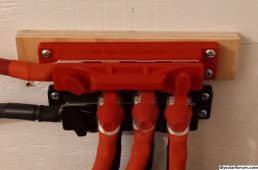uksuntimes
New Member
I’m installing my system for a second time, and am horrified to have now learned about the massive AMP risk of lifepo4 batteries!
I had marine circuit breakers as recommended by Will as I basically built his 12v solar system that uses the renogy MPPT.
However I now believe it should also have a class T fuse between the battery and the system. Is that correct assumption?
If so here are some main stats:
Battery is 200ah 12v lifepo4 renogy Bluetooth smart battery
Goes to system via 35mm cables. 3meters in length. Rated for 240a.
My draw is generally a bunch of small LED items. The main draw is a 3000w inverter that is sometimes used to power an induction hob (up to 1800w).
I will still keep all my existing breakers and fuses etc but I believe adding a t class fuse between the battery and the system is smart.
I’m mostly worried about a short really.
From what I have read a 150a fuse would suffice. But are there different kinds? Does it need to be specifically for a 12v system?
One important note is that I want to add a second battery (same size, make etc) at some point to extend my capacity for longer camping trips. I would plan to fuse and isolate each one independently so if one goes bad I can isolate it safely. But would I then also want a bigger fuse on the main cables?
Part of the problem for me is finding the right size fuse and finding it for purchase in the UK.
Any help would be massively appreciated.
Wasn’t sure which category to post this, but as I’m mostly worried about my safety, I figured this may be a good spot.
Should I also get some rubber gloves for working on the system?
I had marine circuit breakers as recommended by Will as I basically built his 12v solar system that uses the renogy MPPT.
However I now believe it should also have a class T fuse between the battery and the system. Is that correct assumption?
If so here are some main stats:
Battery is 200ah 12v lifepo4 renogy Bluetooth smart battery
Goes to system via 35mm cables. 3meters in length. Rated for 240a.
My draw is generally a bunch of small LED items. The main draw is a 3000w inverter that is sometimes used to power an induction hob (up to 1800w).
I will still keep all my existing breakers and fuses etc but I believe adding a t class fuse between the battery and the system is smart.
I’m mostly worried about a short really.
From what I have read a 150a fuse would suffice. But are there different kinds? Does it need to be specifically for a 12v system?
One important note is that I want to add a second battery (same size, make etc) at some point to extend my capacity for longer camping trips. I would plan to fuse and isolate each one independently so if one goes bad I can isolate it safely. But would I then also want a bigger fuse on the main cables?
Part of the problem for me is finding the right size fuse and finding it for purchase in the UK.
Any help would be massively appreciated.
Wasn’t sure which category to post this, but as I’m mostly worried about my safety, I figured this may be a good spot.
Should I also get some rubber gloves for working on the system?
Last edited:




